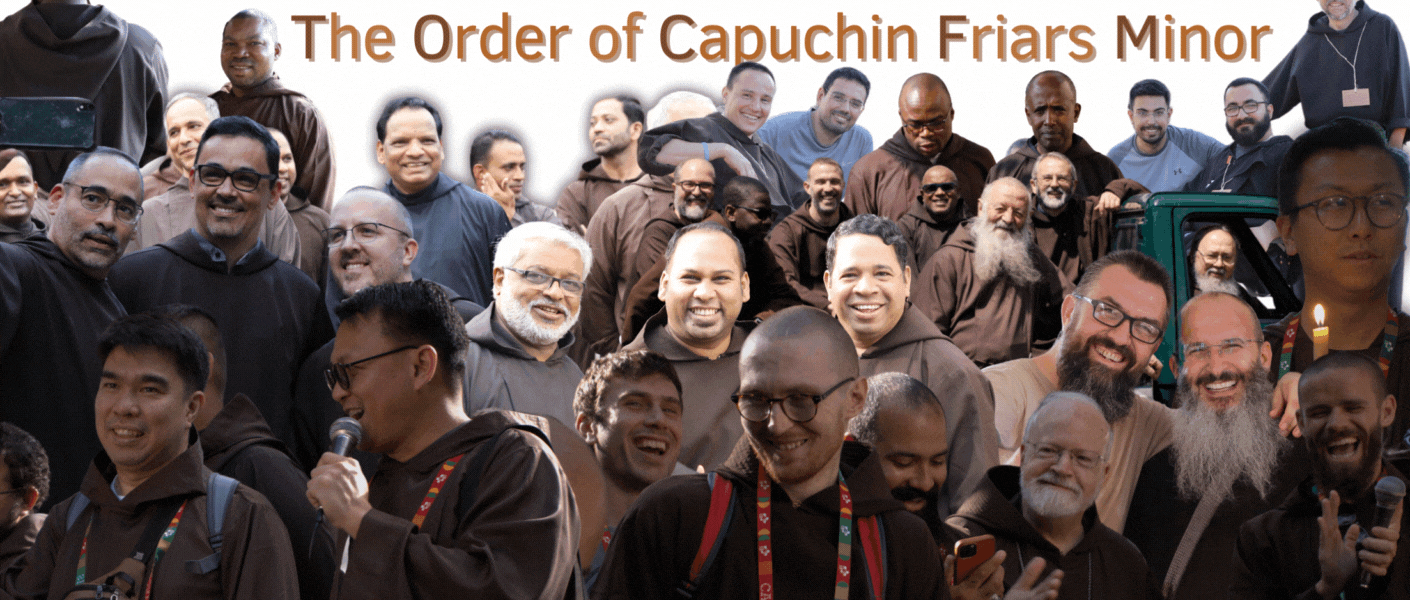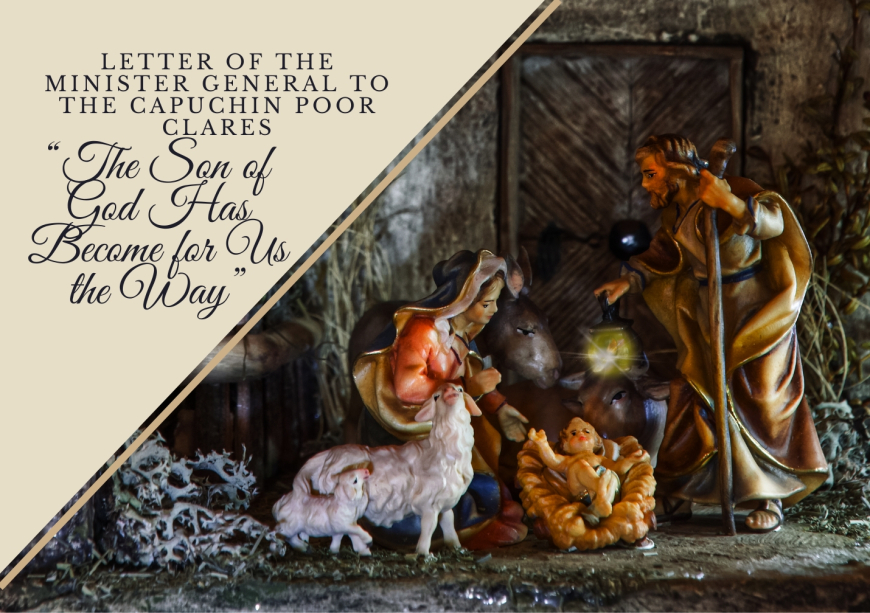Letter of the Minister General
- Published in Other news items
Prot. N. 00053/23
To all the Capuchin Poor Clare Sisters
“The Son of God Has Become for Us the Way”
(St. Clare, Testament, No. 5)
Dear Sisters,
May the Lord give you peace!
In light of the centenaries that we are celebrating as a Franciscan Family, and in keeping with my letter written a few days ago urging the whole Order to reflect on the radiant mystery of “the Son of God who became our bother”[i], I would like to address you specifically with some words of encouragement regarding the path we are travelling in today’s world, because as St. Clare herself emphasizes, “the Son of God has become for us ‘the Way’ that our blessed father Francis, His true lover and imitator, has shown and taught us by word and example.”[ii]
- Two closely related centenaries
1.1 In this year of Our Lord 2023, we begin our common journey with jubilee celebrations recalling both the ecclesial approval of the Rule of the Friars Minor and the memorable Christmas of Greccio, “centenaries that are in some ways closely linked.”[iii] Indeed, from faith in the mystery of the Incarnation, we can fully understand the long and complex process of formulation, editing, capitular approval and ecclesial approval of the form of life that reached its climax as the papal bull canonically approved as the Rule of the Friars Minor.[iv] St. Francis himself, following this delicate road and not exempt from trials and temptations, came to a new and luminous conviction about the mystery of God which manifests itself in the very fabric of humanity – in littleness, tenderness and poverty.
1.2 The Rule is nothing less than a useful tool for defining the parameters of our charism so that we might bring the Gospel to life. It is a special conduit for unceasing movement from faith to life and from life to faith. It is an aid for living the Gospel, that is, for bringing to bear Jesus Christ within us “through a holy activity which must shine as an example before others.”[v]
1.3 St. Clare, keenly aware of her social and ecclesial frames of reference, and at the same time (with her sisters) well-grounded in an astute understanding of her vocation, took as her foundation the text of the Rule of the Friars Minor to establish their form of life. She adjusted it, reformulated it and creatively completed it, adapting it for a more feminine framework and a more contemplative, stable lifestyle, giving rise to the Rule of the Poor Clares, which was approved by papal bull on the eve of her death.[vi] It was yet another example of an intimate connection made between a form of life and faith in the mystery of the Incarnation.
- A new step in the revision of the Constitutions
2.1 Similarly, what we say about the relationship between the Rule and the Incarnation, we could also apply to the Constitutions, which “are a text to protect identity, and to foster both an adequate realization and a means of unity in diversity.”[vii] It would be so wonderful to get to know how your Constitutions were adapted and revised in light of the great mystery of the Word made flesh, with all its spiritual and practical implications. So many different cultures united in a singular vocation as reflected in this regulatory yet inspirational text! A diverse array of sensibilities are drawn together in new contexts on a singular tradition and form of life with common parameters. I leave to you the task of deepening this journey of prayerful reflection and contemplative appreciation.
2.2 For my part in particular, I present to you in anticipation with this letter a draft of proposals for the revision of your Constitutions, which will soon reach your hands in the various languages. The small Commission of three nuns from different geographical areas has successfully carried out the meticulous work of gathering insight from various reflections and discussions, as well as weighing fundamental concerns like the current Church documents and adaption to current canonical provisions, while always maintaining a profound respect for the current physiognomy of the text.
2.3 It is now up to you to cordially receive this revised text. It will be necessary to receive it heartily, weigh it in prayer and fraternal dialog, and in a manner that is mature and clearly open to making specific proposals for any changes. The methodology for this will be explained by the sisters of the Commission of the representatives of the Federations. For my part, I once again invite you to become aware of this exercise as “an excellent way of experiencing the constitutive ‘synodality’ of the Church”.[viii]
- Toward intercultural communities
3.1 The need for making an effort to translate and adapt our spirituality to the particular situations of each culture is a profound one. “Just as Christ, the incarnate Word of the Father, engaged in a specific culture, it is also up to us to incarnate in our daily lives the values we share and that characterize our identity as lesser brothers.”[ix] At the same time, in today’s world which is more and more interconnected and enterprising, we are continually challenged to build bridges of interculturality. “We are called to study well the challenges of the current culture, taking as our starting point the intercultural experiences already happening in the Order. Our charism of fraternity can offer a beautiful witness of how communion can be made real in the world of today.”[x]
3.2 Faith, renewed by our wonder before the mystery of the Incarnation, leads us to the experience of trust, despite our weaknesses and limitations. The consolidated trend towards a reduction in the number of nuns, the decline in vocations and the closure of some monasteries is an inevitable fact, even if in different degrees in the various regions. But this in no way justifies inaction or closure in one’s own needs. We need to open up and welcome with faith the mysterious path that is laid down before us – the true path of incarnation.
3.3 Let me be very clear: fear and human caution can lock us up in their little monasteries with their little problems so often fraught with short-sighted concerns for survival or for the future, when the Spirit of the Lord tells us instead to risk communion, to try to build bridges from our frailty and to demonstrate that fraternity can be initiated by actual experiences of collaboration, exchange, service, re-foundation; even new foundations where the charism is not yet present. It is by no means a question of maintaining walls or of reproducing “what has always been done this way” nor of prolonging situations that are lifeless. This is a new dynamic with a strong human need for the ability to dialog across cultures, and it is one that requires a spiritual background of trust and Franciscan self-giving.
3.4 We truly thank God and are glad that in this spirit a new foundation of Capuchin Poor Clares is being initiated in Paraguay, with the collaboration of sisters from all over the Americas. Indeed, such projects of collaboration, be they federative or inter-federative, can only be realized in this harmonious manner, with the awareness and the cooperative responsibility of our charism.
3.5 In this same spirit, the refoundation of the monastery of San Giovanni Rotondo in Italy will take place with the sisters of the federation of Northern Mexico, who have taken up this challenge; and we hope it will be realized soon. The importance of the Shrine of St. Pio of Pietrelcina is clear as is the significance of the presence of contemplative life upon its grounds, through which pass so many pilgrims. This is why we can say that, although it is not an historical site, it is a very significant one that warrants the Order’s push for international collaboration, encouraging the sisters to respond generously and promptly.
3.6 I would like to invite each sister to examine within herself her own availability and to hear within whether the voice of the Spirit is inviting her to trust and to live “without anything of her own” and to leave her own community for such worthy projects of intercultural and inter-Franciscan collaboration. Even more so, I’d like to encourage the mother abbesses and the presidents to open themselves to spiritual discernment with evangelical, not worldly, prudence to weigh the truth of what motivates the sisters and to support these kinds of initiatives. We must always remember that those of us who bear the burden of serving with authority over others must give an account to the Lord should we become obstacles to His of grace.
- The monastery in Rome
4.1 To be even more particular, I would like us to dwell on the “Corporis Christi” monastery in Rome, considering that its history and presence are very special. From their origin, the Capuchin nuns of St. Clare were summoned by the pope himself to his diocese.[xi] For this reason, it is a community called to live the catholicity of the Church in a special way and to be an especially prayerful support to the Petrine ministry.
4.2 Similarly, as a monastery under the direct supervision of the General Minister, and throughout its long history, it has manifested the vital and reciprocal communion between Capuchin men and women, spiritually supporting the Order’s overall mission and its means for international government and animation. The place of residence has changed various times until it has reached its current location in the Garbatella district. Notably, in recent years the community has been responsible for hosting the International Formation Project.
4.3 International and intercultural characteristics are deeply ingrained in the identity and the invaluable mission of this monastery. Both the members of the community and the participants in the Formation Project can easily attest to this, as they can from the close relationships maintained with the brothers who work at the general level of the Capuchin Order, and with so many brothers and sisters from all over the world who serve the universal Church in Rome.
4.4 Without likening it to a kind of mother house as is the case in centralized orders, the monastery of Rome is, in a sense, the home of all Capuchin Poor Clares around the world and it also forms the moral center for all communities. We can say without exaggerating that it is the primary place for “hands-on” learning when it comes to living the charism in intercultural situations, as has been demonstrated in recent years.
4.5 Keeping in mind this awareness, this history, this mission, the current challenge of interculturality and above all our Franciscan confidence (the fruit of faith in the mystery of the Incarnation) I offer to you my appeal for a tangible sign of affiliation and collaboration. May each Federation send at least one sister to be part of this significant community, to configure it more and more as the international face of the Capuchin Poor Clares!
4.6 We thank the Lord, the sisters and the federations for what has already been achieved in so many years of journey, with all its successes and failures, but certainly with much more light than shadows by the grace of God. And let us continue this journey with courage, venturing onward with that renewed enthusiasm that comes from knowing God is with us.
- The International Formation Project
5.1 The Formation Project was promoted by us friars, as a response to the need to prepare sisters who can undertake and support formation in their respective monasteries and thus strengthen the various federative and national formation initiatives, wherever Capuchin contemplative nuns are present. It’s had several manifestations: first at the Monastery of St. Urban in Rome, then at the International College of St. Lawrence with a special one-year course and, finally, the current one at the Garbatella Monastery from where one can enter the University.
5.2 The federation presidents and their respective councils consider the objectives and the methodology of the project as a whole to be very positive; likewise, the sisters who participated greatly appreciate the training they received. As for the impact this program makes, on a personal level, the formation in terms of personal maturity and charismatic identity stands out, as well as the understanding of the world and of cultures with intellectual astuteness and historical knowledge, always to the benefit of the contemplative vocation. Also, at the community and federation level there is a high degree of satisfaction with the way in which the formation is received and shared. Learning the Italian language presents itself as the first important challenge which, although it may often seem like an obstacle, holds great potential for communication and international communion.
5.3 It is clear that we need to maintain growth and continuity. Looking to the future, we would like to welcome your suggestions, which are many and varied, and which certainly deserve to be evaluated and fine-tuned for implementing some of the proposals. In the meantime, I ask the federations to be open to sending new student sisters so that we can continue the pacing of the project as planned.
- Conclusion
6.1 “God is all gift, sheer delivery. He reserves nothing of himself for himself. His expansive dynamism of love is made concrete in the Incarnation, by which, through the Son, the world is filled with God. The Creator, by taking on the nature of his creation, transforms our history into a history of love.”[xii] Based on this certainty, I invite you sisters to continue to walk the path of your vocation with gratitude and trust.
6.2 From our poverty and despite our limitations, we walk attached to the Blessed Virgin, “most sweet mother who gave birth to a Son Whom the heavens could not contain, and yet she carried Him in the little cloister of her holy womb and held Him on her virginal lap.”[xiii] May she care for and bless each of you.
Fraternally,
Br. Roberto Genuin
General Minister OFMCap
Rome, 2 February 2023
Feast of the Presentation of the Lord
[ii] St. Clare, Testament, No. 5.
[iii] Br. Roberto Genuin, The Son of God Became Our Brother, No. 2; Rome; January 1, 2023.
[iv] Cf. Pope Honorius III, Bolla “Solet annuere”; Lateran, November 29, 1223.
[v] St. Francis of Assisi, Letter to All the Faithful, No. 10.
[vi] Cf. Pope Innocent IV, Bolla “Solet annuere”; Assisi, August 9, 1253.
[vii] Br. Roberto Genuin, A Letter of the General Minister to the Capuchin Poor Clare Sisters, No. 1; Rome, September 17, 2019.
[viii] Ibid., No. 3.
[ix] Br. Roberto Genuin, The Son of God Became Our Brother, No. 14; Rome, January 1, 2023.
[x] Br. Mauro Jöhri, Two Faces of the Same Charism, No. 2.4; Rome, March 1, 2017.
[xi] Cf. Pope Gregory XIII, Breve “Cupientes”; Rome, March 1, 1576.
[xii] Br. Roberto Genuin, The Son of God Became Our Brother, No. 15; Rome, January 1, 2023.
[xiii] St. Clare, The Third Letter to Agnes of Prague, No. 18-19.



